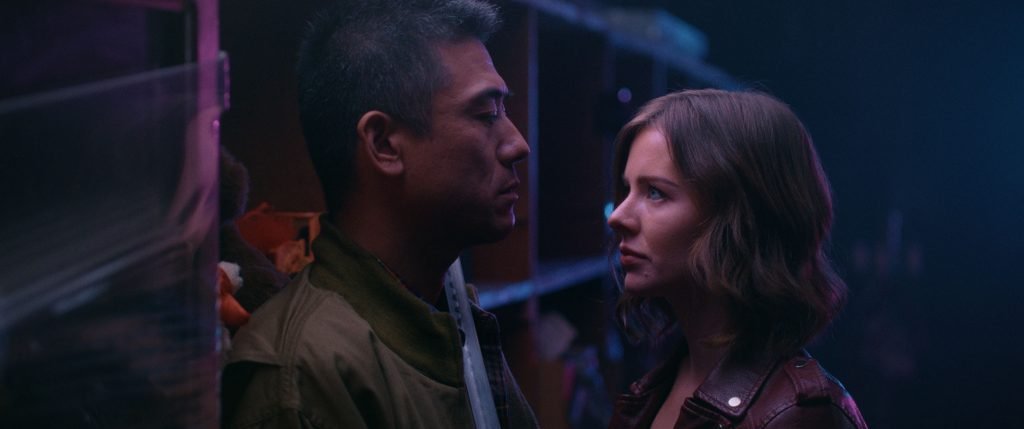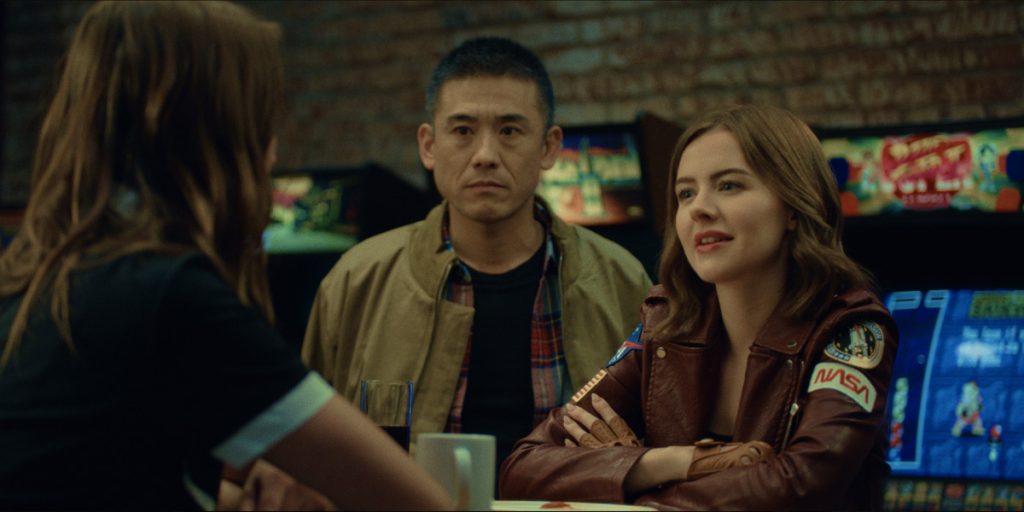Bay area director Peter Hsieh’s debut Drive All Night nails its neon noir aesthetic but suffers from an underdeveloped script.
There is a permanent sense of defeat that clings to the expression on Dave’s face. Content to sit back and blend into the night, it’s hard to tell if the late-night taxi driver is exhausted, depressed, bored, or all three at once. In Peter Hsieh’s Drive All Night, the mood that is most easy to pick up on is a kind of after-hours sluggishness, the aloof liberty that comes with being dragged through the darkness; this is most strongly felt through his protagonist, as well as star Yutaka Takeuchi’s resigned performance. In direct contrast, Cara (Lexy Hammond), a young woman who serves as Dave’s fare through the endless night, is talkative and bold, keenly interested in his hangdog apathy. What little plot the film contains is mostly powered by Cara, who pushes Dave along through a series of bizarre, secretive encounters.
Visually, Hsieh seems eager to pull from any aesthetic he can find – the film feels like an attempt at a Lynchian spin on Collateral, while also incorporating direct references to Tarantino, 8-bit arcade games, and the dark hues of film noir. Though shot on crisp digital cameras, Hsieh and cinematographer William Hellmuth nail the shadow work required of any noir riff, and a vibrant blue-orange color palette serves to illuminate the dark city just enough. The production details are generally quite strong, from eerily lit, horror-adjacent hallways, the glow of arcade machines, and Cara’s garishly patched leather jacket. These bright details – my favorite being the name of the prominent arcade-bar setting, “Miniboss”- all service the video game motif Hsieh frequently leans into. Robert Daniel Thomas’ score, a synth-heavy throwback, aids this as well.

Less clear is what exactly Hsieh and his team are trying to accomplish with some of these aesthetic choices. The design heavily tilts the viewer towards expecting something a little more action-heavy, but the film is quite slow and dreamy. My initial thought was that the notion of an old arcade game is essentially to do the same thing over and over, similar to the grind of working a crappy job or the toll of the endless march of time, something many of Hsieh’s characters seem to struggle with. This read still feels a bit specious, however, as the film pushes itself further into non-sequiturs and dream imagery that feel a touch too vague when paired with lengthy monologues about Pac-Man and Bill Clinton impersonators. The noir elements are most successful, and the sleepy tone is accentuated well by many long takes of character’s faces.
In more general terms, the film’s many heightened design choices might simply be to create a feeling of unreality. This would be fine, but there is almost nothing to ground much of what is going on. Dave’s characterization in the script is very cipher-like, while Cara’s tendency to monologue in matter-of-fact detail jars against several esoteric set pieces. At one point early into the film, the two encounter a singer with a mysterious identity, and Cara’s explanation of that identity makes the encounter far less interesting than it might otherwise have been.
This is also let down by the ending, which ties things to a more conventional romantic subplot and drops several of the film’s more interesting elements. Chief among these is Lenny, a mysterious gamer hitman on the hunt for Cara. His motives are never entirely clear, which makes for an interesting character who is very well-performed in almost total silence by Johnny Gilligan. By the end of the film, his inclusion feels frustratingly nebulous at best as the film drops any sort of thriller tension very early on for a slower, dreamier tone.
Drive All Night looks great and has a lot of interesting ideas. Its most glaring flaws come through the script’s lack of specificity, leaving many of its situations suffering from either under- or over-explanation. Hsieh’s debut remains in the mind as a promising technical showcase in need of stronger scaffolding.
Drive All Night will be screened digitally at Cinequest 2021 March 20-30, 2021.

